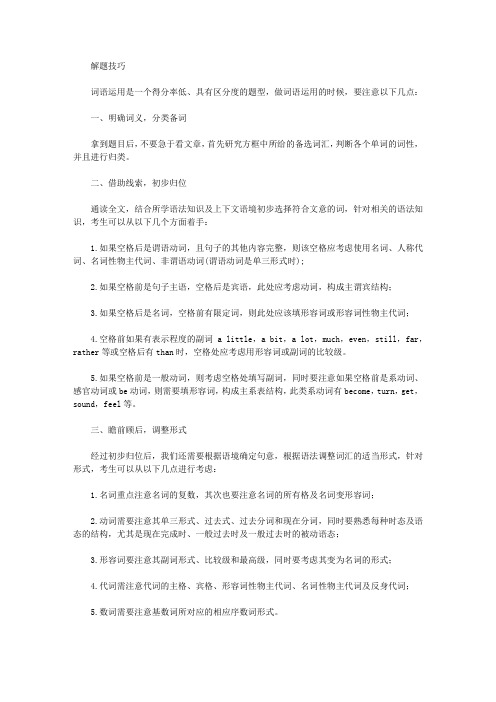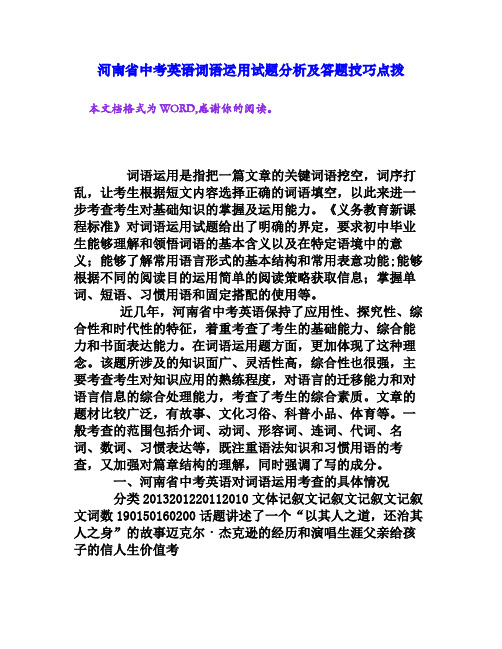中考英语专项讲解词语运用剖析
中考英语历年词汇运用高分策略及真题分析

中考英语历年词汇运用高分策略及真题分析词汇运用在中考英语考试中占据了重要的位置,掌握好词汇的运用策略能够帮助我们得到更高的分数。
下面将为大家详细介绍中考英语历年词汇运用的高分策略,并分析几道真题。
一、记忆和积累词汇的方法1. 利用词根和词缀记忆词汇很多英语单词都具有共同的词根和词缀,通过记忆这些词根和词缀,可以帮助我们推测和记忆更多的单词。
比如,"graph"表示"写",我们可以联想到很多与"写"有关的单词,如"graph"(图表)、"autograph"(亲笔签名)等。
这样一来,我们可以通过记忆一个词根来扩展我们的词汇量。
2. 制定有效的记忆计划制定一个合理的记忆计划,按照每天的需求和任务来记忆词汇。
可以将词汇整理成单词卡片,每天花一点时间进行复习。
记忆时可以采用分组记忆、联想记忆的方法,将单词和具体的场景或图像联系在一起,加深记忆。
二、词汇运用的高分策略1. 看懂题干的关键词英语考试中,很多题目会通过关键词来引导我们找到准确答案。
我们需要仔细阅读题干,将关键词圈出来,明确题目的要求。
比如,"What do you think of the book?"这个问题中的关键词是"think",而不是"book",所以我们需要重点考虑自己的想法和观点。
2. 利用上下文和语境进行推测如果遇到不认识的单词,可以通过上下文和语境来进行推测。
根据句子的意思和结构,以及其他已经熟悉的单词,我们可以猜测出新单词的词义。
比如,"The room is very bright because of the large windows. "这句话中,我们可以通过"bright"和"windows"这两个词的关系来推测出"bright"的词义是"光亮的"。
精选-中考英语题型专项复习题型三词汇运用课件

5
第四步 复读全文,细心检查。 完成填空检查每一个填空处是否有笔误,只有这样才能减少疏漏, 提高做题的正确率。
精选中小学课件
6
潍坊题型三 词汇应用
精选中小学课件
1
第一步 跳过空格,通读全文,从而把握文章大意。 每篇文章都是有逻辑性的,文章段落之间必然承上启下、 前呼后应。因此通读全文是必要的,目的是对文章有个全 面的了解,弄清其中心思想和大意。反之,只在一点、一 处做文章的话,则会导致断章取义。但我们要注意通读全
精选中小学课件
2
文只要能了解短文的大意即可,细节不必理解,可以跳过, 切忌逐字逐句地反复细读。在阅读时要特别注意一篇文章的 开头(一般不设空)和结尾,它们能提供主要的信息,帮助了 解全文所描述的事件或文章的中心思想。
精选中小学课件
3
第二步 结合提示词,综合考虑,写出答案。 文章一般设置语境语义题、语法结构题、上下文线索题和句 法结构题。填词时一定要注意上下文的关系,这对于把握文 章的整体意义大有用处。考虑要全面,名词要考虑单复数形 式,动词要考虑时态、语态,形容词要考虑需不需要用比较 级或最高级。
精选中小学课件
4
第三步 先易后难,各个击破。 第一次填空时,无法全部做出是很正常的。我们要先把确 定的空完成,再逐个攻破难题。要学会跳读,对不理解的 地方采用暂时回避的方式,待真正理解全文之后再找解决 的方法。对于难度较大的空,可以尝试口头翻译句子的意 思,把它前后的句子意思联系在一起。
精选中小学课件
中考英语词语运用考点跟踪(解题技巧+真题解析)

解题技巧词语运用是一个得分率低、具有区分度的题型,做词语运用的时候,要注意以下几点:一、明确词义,分类备词拿到题目后,不要急于看文章,首先研究方框中所给的备选词汇,判断各个单词的词性,并且进行归类。
二、借助线索,初步归位通读全文,结合所学语法知识及上下文语境初步选择符合文意的词,针对相关的语法知识,考生可以从以下几个方面着手:1.如果空格后是谓语动词,且句子的其他内容完整,则该空格应考虑使用名词、人称代词、名词性物主代词、非谓语动词(谓语动词是单三形式时);2.如果空格前是句子主语,空格后是宾语,此处应考虑动词,构成主谓宾结构;3.如果空格后是名词,空格前有限定词,则此处应该填形容词或形容词性物主代词;4.空格前如果有表示程度的副词 a little,a bit,a lot,much,even,still,far,rather等或空格后有than时,空格处应考虑用形容词或副词的比较级。
5.如果空格前是一般动词,则考虑空格处填写副词,同时要注意如果空格前是系动词、感官动词或be动词,则需要填形容词,构成主系表结构,此类系动词有become,turn,get,sound,feel等。
三、瞻前顾后,调整形式经过初步归位后,我们还需要根据语境确定句意,根据语法调整词汇的适当形式,针对形式,考生可以从以下几点进行考虑:1.名词重点注意名词的复数,其次也要注意名词的所有格及名词变形容词;2.动词需要注意其单三形式、过去式、过去分词和现在分词,同时要熟悉每种时态及语态的结构,尤其是现在完成时、一般过去时及一般过去时的被动语态;3.形容词要注意其副词形式、比较级和最高级,同时要考虑其变为名词的形式;4.代词需注意代词的主格、宾格、形容词性物主代词、名词性物主代词及反身代词;5.数词需要注意基数词所对应的相应序数词形式。
四、通读全文,复核验证复读短文,检查单词拼写是否正确,注意时态、语态、主谓一致和固定搭配,还有首字母的大小写。
中考英语常考易错点专题讲练:词汇运用(含答案解析)【12页】

词汇运用易错清单一、考点分析词汇运用试题主要是考查学生对单词的拼写能力、词形变化和语法知识运用以及词组辨别能力等。
试题通常以语篇、对话或句子的形式出现,测试内容以实词为主,虚词很少。
这一题型中所给的词几乎覆盖了所有的词性,比如名词、动词、形容词、数词、量词、代词、副词等。
填空时要考虑名词的单复数、动词的第三人称单数、现在分词、过去分词;形容词、副词的比较等级;数词的基数词、序数词等。
测试题型可以归为两大类:单词拼写和词形填空。
其中单词拼写一般有两种题型:①根据句意及首字母提示填写所缺单词;②根据句意及汉语提示填写所缺单词。
词形填空也包括两种题型:①用所给词的适当形式填空;②选词并用其适当形式填空。
二、构词法英语构词方法主要有三种:即合成、派生和转化。
(一)转化英语单词的词性非常活跃,名词用作动词,动词转化为名词,形容词用作动词等现象非常普遍,这种把一种词性用作另一种词性的方式就叫做词性的转化。
阅读中经常出现转化词,只要抓住单词的原始意思,结合句子成分,就容易弄清它们的引申义。
1. 动词和名词之间的相互转化。
有时意思变化不大,有时有一定的变化。
1)动词转化为名词。
如:Shall we go out for a drive next Sunday? 下个星期天咱们出去驱车旅行,好吗?句中的drive由动词转化为名词(词意引申为“驱车旅行”)。
如:I often go there for a walk. 我经常去那里散步。
(句中walk由动词转化为名词)2)名词转化为动词。
如:Have you booked your ticket? 你的票订好了吗?(句中book由名词转化为动词,词意引申为“订购”)Hand me your knife, please. 请把你的刀子递给我。
(句中hand由名词转化为动词,词意引申为“传递”)2. 少部分形容词转化为动词。
如:The train slowed down to half its speed. 火车速度减慢了一半。
中考英语常考易错点专题教案+学案:词汇运用(含答案解析)

词汇运用易错清单一、考点分析词汇运用试题主要是考查学生对单词的拼写能力、词形变化和语法知识运用以及词组辨别能力等。
试题通常以语篇、对话或句子的形式出现,测试内容以实词为主,虚词很少。
这一题型中所给的词几乎覆盖了所有的词性,比如名词、动词、形容词、数词、量词、代词、副词等。
填空时要考虑名词的单复数、动词的第三人称单数、现在分词、过去分词;形容词、副词的比较等级;数词的基数词、序数词等。
测试题型可以归为两大类:单词拼写和词形填空。
其中单词拼写一般有两种题型:①根据句意及首字母提示填写所缺单词;②根据句意及汉语提示填写所缺单词。
词形填空也包括两种题型:①用所给词的适当形式填空;②选词并用其适当形式填空。
二、构词法英语构词方法主要有三种:即合成、派生和转化。
(一)转化英语单词的词性非常活跃,名词用作动词,动词转化为名词,形容词用作动词等现象非常普遍,这种把一种词性用作另一种词性的方式就叫做词性的转化。
阅读中经常出现转化词,只要抓住单词的原始意思,结合句子成分,就容易弄清它们的引申义。
1. 动词和名词之间的相互转化。
有时意思变化不大,有时有一定的变化。
1)动词转化为名词。
如:Shall we go out for a drive next Sunday? 下个星期天咱们出去驱车旅行,好吗?句中的drive由动词转化为名词(词意引申为“驱车旅行”)。
如:I often go there for a walk. 我经常去那里散步。
(句中walk由动词转化为名词)2)名词转化为动词。
如:Have you booked your ticket? 你的票订好了吗?(句中book由名词转化为动词,词意引申为“订购”)Hand me your knife, please. 请把你的刀子递给我。
(句中hand由名词转化为动词,词意引申为“传递”)2. 少部分形容词转化为动词。
如:The train slowed down to half its speed. 火车速度减慢了一半。
2024年河北中考英语词语运用解题技巧课件

2024年河北中考英语词语运用解题技巧课件全文共6篇示例,供读者参考篇1Title: Mastering Vocab Tricks for the 2024 Hebei Zhongkao English ExamHey there, fellow students! Are you feeling a little nervous about the English vocabulary section of the upcoming Zhongkao exam? Don't worry, because I've got some awesome tips and tricks to help you ace it! Let's dive right in and make sure you're fully prepared to conquer those pesky words.Tip #1: Create a Vocab WonderlandImagine a magical world where words come alive! That's what we're going to create. Grab some colorful notecards or sticky notes, and start writing down the vocabulary words you need to learn. But here's the fun part – draw little pictures or symbols next to each word to help you remember it better. For example, if the word is "ambitious," you could draw a little person climbing up a mountain. Making these visual connections will make the words stick in your mind like magic!Tip #2: Play Word GamesWho says learning vocab has to be boring? Turn it into a game! Challenge your friends or family members to a round of "Vocab Charades" or "Vocab Pictionary." Act out or draw the meanings of different words, and see who can guess them correctly. You can even turn it into a competition by keeping score. Not only will you have a blast, but you'll also be reinforcing those vocabulary words without even realizing it!Tip #3: Become a Word DetectiveEvery word has a story to tell, and you're going to be the detective who uncovers it! Take a closer look at the prefixes, suffixes, and root words that make up the vocabulary words you're studying. For instance, if you see the prefix "re-" in a word like "rearrange," you can deduce that it has something to do with doing something again. Understanding these word parts will give you a deeper comprehension of the vocabulary and help you decipher unfamiliar words in the future.Tip #4: Create Mnemonic MonstersMnemonics are like little memory helpers that make it easier to remember things. Let's create some mnemonic monsters for those tricky vocabulary words! For example, if you're trying toremember the word "procrastinate," you could come up with a silly phrase like "Penguins Rarely Obviously Catch Rats And Swim Terribly In Nearby Arctic Territories Endlessly." The first letters of each word spell out "procrastinate," and the silly phrase helps cement the word in your mind.Tip #5: Immerse Yourself in WordsSurround yourself with vocabulary everywhere you go! Stick Post-it notes with vocab words around your room, on your mirror, or even on the fridge. Listen to podcasts or audiobooks that use advanced vocabulary. Watch movies or TV shows in English and pay attention to the words used. The more you immerse yourself in a word-rich environment, the more those vocabulary terms will become second nature to you.Tip #6: Make Vocab ConnectionsWhen you're learning a new word, try to connect it to something you already know or have experienced. For instance, if you're studying the word "perplexed," think of a time when you felt really confused or puzzled about something. Making personal connections like this will help the words stick in your memory better.Tip #7: Reward YourselfLearning vocabulary can be tough work, so don't forget to reward yourself along the way! Set small goals, like mastering 10 new words a week, and treat yourself to something fun when you achieve them. Maybe it's watching your favorite movie, going out for ice cream, or playing your favorite video game. Positive reinforcement will keep you motivated and make the learning process more enjoyable.Remember, mastering vocabulary is all about finding strategies that work best for you. Don't be afraid to experiment and have fun with it! With these tips and tricks up your sleeve, you'll be a vocabulary master in no time, ready to tackle the Zhongkao English exam with confidence.Good luck, and happy word-learning!篇2Tips for Rocking the Vocab on the 2024 Hebei Middle School English Test!Hey there, friends! It's me, your pal who loves to learn new words and use them in awesome ways. Today, I'm going to share some super cool tips for nailing the vocabulary part of the 2024 Hebei Middle School English Exam. Get ready to become a word wizard!Tip #1: Read, Read, Read!The more you read in English, the more new words you'll learn without even trying! Books, magazines, websites – read anything and everything you can get your hands on. Pay attention to words you don't know, and try to figure them out from the context clues. Then, look them up and add them to your vocab list!Tip #2: Make Flashy FlashcardsFlashcards are classic study tools, but let's make them fun! Use bright colors and silly drawings to illustrate new words. You could even cut the cards into funky shapes. The sillier they are, the more you'll remember them. Crack up your friends by quizzing each other with your goofy cards!Tip #3: Play Mad LibsThis classic word game is an awesome way to practice using different parts of speech. Take turns filling in the blanks with nouns, verbs, adjectives, and more. The crazier the word choices, the funnier the story gets! You'll be laughing so hard, you won't even realize you're studying vocab.Tip #4: Use New Words in ConversationsOnce you learn a cool new word, use it as much as you can when talking to your friends and family. They'll think you're so smart and sophisticated! Warning: They may get jealous of your impressive word power. But don't worry, just teach them the new words too. You'll all become vocab geniuses together!Tip #5: Listen to Music and Watch ShowsSinging along to your favorite English songs is an amazing way to learn new vocabulary. Same goes for watching TV shows and movies in English. The words will stick in your brain so much better when they're set to a catchy tune or tied to a funny scene. Plus, you get to enjoy some awesome entertainment at the same time!Tip #6: Keep a Vocab JournalStart a special notebook where you write down new English words, their definitions, and sample sentences using them. Drawing a little picture beside each one will help it stick in your memory. Flip through your journal every day to review, and pretty soon those new vocab words will be old friends!Tip #7: Play Word GamesSeriously, games that involve words are the best! Classics like Scrabble, Boggle, and Upwords make learning new vocabsuper fun. You can even play lots of great word games online or on your phone whenever you have some free time to kill. Mom always says, "All work and no play is no way to learn English!" She's so篇32024 Hebei Zhongkao English Vocabulary Application and Problem-Solving TechniquesHey there, fellow English learners! It's me, your friendly neighborhood primary school student, here to share some awesome tips and tricks for mastering vocabulary application and problem-solving in the 2024 Hebei Zhongkao English exam. Get ready to unleash your inner wordsmith and puzzle-cracking genius!First things first, let's talk about vocabulary. Words are like the building blocks of language, and the more you have in your toolbox, the better you'll be able to express yourself and understand others. But simply memorizing a bunch of words isn't enough – you need to know how to use them properly in context. That's where vocabulary application comes in.Imagine you're playing a game of Scrabble with your friends, but instead of just randomly placing letters on the board, youhave to create meaningful words and sentences. That's what vocabulary application is all about – using the right words in the right way to convey your message clearly and effectively.One of the coolest techniques for mastering vocabulary application is the good old "word family" trick. You know how some words look and sound similar, like "happy," "unhappy," and "happiness"? Well, those are part of the same word family, and learning them together can make it easier to remember their meanings and usage.Another nifty trick is to create vivid mental images or associations with the words you're learning. For example, ifyou're trying to remember the word "plethora," you could imagine a bunch of platypuses (yes, that's the plural form) running around and causing chaos – a "plethora" of platypuses, if you will. Silly? Maybe. But it works!Now, let's move on to problem-solving. This is where you get to flex your puzzle-cracking muscles and show off your critical thinking skills. Whether it's comprehending a tricky reading passage or tackling a head-scratching grammar exercise, having a solid problem-solving strategy can make all the difference.One of the most important things to remember is to read the instructions carefully. I know, I know, it sounds like something your teacher would say, but it's true! Many times, students make careless mistakes simply because they didn't understand what the question was asking them to do.Another handy technique is to break down complex problems into smaller, more manageable parts. It's like trying to eat a massive burger – you wouldn't just shove the whole thing into your mouth at once (well, maybe you would, but that's not a good idea). Instead, you'd take it one bite at a time, right? The same principle applies to problem-solving.And don't forget to use the process of elimination when you're unsure of the correct answer. If you can eliminate a few of the options, your chances of guessing the right one increase significantly. It's like playing a game of "hot or cold" with the answers – you keep getting closer and closer until you finally strike gold!But remember, learning English (or any language, for that matter) is a journey, not a destination. It's okay to make mistakes – that's how you learn and grow. So, keep an open mind, stay positive, and most importantly, have fun with it!Alright, my fellow word warriors and problem-slayers, that's it from me. Now go out there and show the 2024 Hebei Zhongkao English exam who's boss!篇4当然可以!以下是一篇关于2024年河北中考英语词语运用解题技巧的课件文章,使用小学生的语言风格。
河南省中考英语词语运用试题分析及答题技巧点拨

河南省中考英语词语运用试题分析及答题技巧点拨本文档格式为WORD,感谢你的阅读。
词语运用是指把一篇文章的关键词语挖空,词序打乱,让考生根据短文内容选择正确的词语填空,以此来进一步考查考生对基础知识的掌握及运用能力。
《义务教育新课程标准》对词语运用试题给出了明确的界定,要求初中毕业生能够理解和领悟词语的基本含义以及在特定语境中的意义;能够了解常用语言形式的基本结构和常用表意功能;能够根据不同的阅读目的运用简单的阅读策略获取信息;掌握单词、短语、习惯用语和固定搭配的使用等。
近几年,河南省中考英语保持了应用性、探究性、综合性和时代性的特征,着重考查了考生的基础能力、综合能力和书面表达能力。
在词语运用题方面,更加体现了这种理念。
该题所涉及的知识面广、灵活性高,综合性也很强,主要考查考生对知识应用的熟练程度,对语言的迁移能力和对语言信息的综合处理能力,考查了考生的综合素质。
文章的题材比较广泛,有故事、文化习俗、科普小品、体育等。
一般考查的范围包括介词、动词、形容词、连词、代词、名词、数词、习惯表达等,既注重语法知识和习惯用语的考查,又加强对篇章结构的理解,同时强调了写的成分。
一、河南省中考英语对词语运用考查的具体情况分类2013201220112010文体记叙文记叙文记叙文记叙文词数190150160200话题讲述了一个“以其人之道,还治其人之身”的故事迈克尔・杰克逊的经历和演唱生涯父亲给孩子的信人生价值考值名词2分2分1分2分代词1分2分1分1分动词3分2分2分4分形容词2分1分1分1分连词1分1分2分/介词1分1分1分/副词//1分1分数词/1分1分1分纵观20XX年以来的河南省中考英语词语运用试题不难看出,该题型主要基于以下几个方面来命题:(一)重点考查单词拼写、语言基础知识,在考查词汇的同时考查读与写的能力。
这就要求考生首先要把握住短文的主旨大意,答题时除了考虑词法、句法,还要研究语篇中句子的结构、衔接和连贯等问题。
中考英语考点剖析(精品).doc

中考英语考点剖析客观题一.单项选择2010年卷动词辨析单项选择:包含了比较多的基础知识点,其屮主要考察的是词汇和语法,但是随着每年屮考一步步的改进,更注重学生的实际运用能力了。
纯粹考语法的题目在逐渐减少,取而代Z的是在着重考查单词、词组在特殊语境中的含义。
因为考生易被干扰项迷惑,从而失分。
所以要注意不要形成思维定势。
特点:重点突出,覆盖而广;答案唯一,选对不易;重视语境,强调情景;迷惑性大,综合性强等注意事项:语法点广泛(牢记各基础知识点)常考知识点(熟练掌握,灵活运用,综合运用,具体分析)词语辨析逐渐扩大范围,动词,形容词,副词等(积累,练习)情景交际作为重点,每年必考,注重学生运用生活英语的能力(阅读英语国家人的文章,适当阅读杂志和观看电影)二、完形填空特点:一种测试考生综合运用英语语言知识能力的一种题型,它集阅读理解能力与语言应用能力考查于一休,考查考生在阅读理解基础上,在一定语言情景下灵活运用词汇的能力。
应具备的能力:具备较强的阅读能力,具备能根据短文所给线索,捕捉和关信息,进行分析判断、逻辑推理的能力具备熟练运用所学词汇、语法、习惯用语及交际用语等语言知识的能力考察趋势:由于完形填空属于有障碍性的阅读,考生对阅读这些含有空缺单词的短文没有把握、困难较大,所以往往望题生畏。
因而完形填空历来是小考小考生失分率较高的题型。
以往完形填空试题的考点主要集中在词汇、语法、句法上,对语篇背景考虑不多,近年来考查的重点己由在语篇中考查语法逐渐转向对语篇的整体理解。
比如I多数试题所设选项女11单从语法角度来判定都是正确的,但一旦联系语篇内容,则只冇一个正确答案。
必须做到的:要掌握一定的语法、词汇知识要有计划地多做一些完形填空的练习,逐渐增加训练的频度,提高训练的难度,通过训练提高阅读理解能力,做到能根据短文所给线索和信息进行分析、推理、归纳、判断,进一步提高词语辨析和灵活运用的能力平时多读多练,不断拓宽知识面,进一步了解英美风土人情等有关文化背;t矩识,熟练掌握英语习惯用语的表达等三、阅读理解特点:主要是考查考牛综合运用所学语言知识的能力,包括阅读能力、理解能力、归纳概括能力、逻辑推理能力以及对材料的评估能力等,主要用于检验学生英语的综合水平和解题能力的高低。
